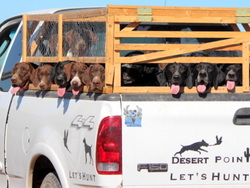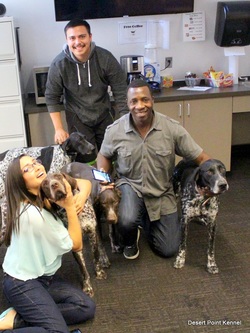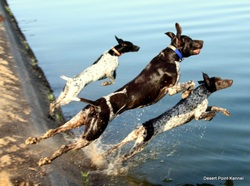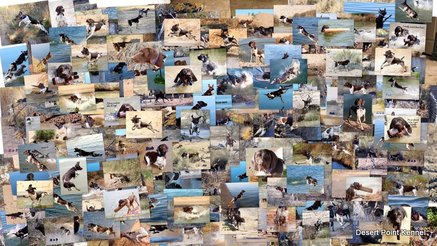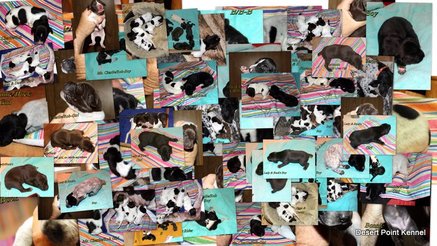Also visit us at our other website: http://www.desertpointkennel.com
We breed only the very best Versatile Hunting Dogs.
We Breed the Best to the Best.The German Shorthaired Pointer should be more than just a pointing dogs who points birds. Far to many breeders are focused on field trial type pointing dogs that run far to big, hunt far to out for them self and not for the hunter. Lacking a love of water, with no natural retrieve. Their genetic make up is more like an English Pointer, and not like our beloved Shorthair.
|
Our Breeding Program.We want the whole package and then some. We want a genetically programmed dog that is a close to medium range hunting dog that hunts for and with the hunter as a member of the team. Each of our dogs must also have a natural point and must back or (honor) another dog on point, a natural retrieve, and a love of water, with great water work. We want a dog that has a temperament that is so loving toward people that you can take them anywhere.
|
Great Family DogI believe that if all German Shorthairs were like the ones in our pack (The Gang), Labradors would not be the #1 AKC registered dog, but Shorthairs would move from 11th to first. Our Gang is used as Therapy Dogs in the Care Centers, and Veterans Groups. Our dogs make great hunting dogs, and great family dogs. Why? Simply because it's the same genetic make up. What makes a great hunting dog, also makes a great family dog. GSPs must love the water and have a great retrieve to make a great duck dog. Works well when the family goes to the lake or river. Because of the great natural love of retrieving, birds or balls. German Shorthairs love to play and retrieve balls. A close to medium ranging dog is good for your hunt, walk, or hike. A great temperament and love of people is great for the hunt or the house. German Shorthairs love to be around people, love to be in your lap, and love to sleep in your bed. They are your best friend, and love to be part of the family.
|
Let's take a look at our breeding Program, and see how we do it.
|
I believe that people go wrong in a breeding program for a few reasons. Most don't put their heart and mind to it with a goal to produce better dogs. Many don't have a clue to what makes a great hunting dog, or even a great family dog. A breeder must first and foremost be able to think on their feet and have common sense to handle ever changing challenges. Many don't have a breeding program in the real sense. They have a male and female, and with their first litter they have no where to go. Can't breed back to the daughter or son. And last there must be enough resources and time to get the job done.
|
Each puppy starts with genetics that will influence every area of it's being. Everything is genetics, your job will evolve development. l Everything that we want in our German Shorthair will be there or not because of genetics. We want a med to close working dog, don't breed to big runners. Want a natural retrieve, breed to dogs that love to retrieve. If a dog does not like the water, there is a big chance that it's pups won't either. If you don't want your dog to fight with other dogs, dog breed dog that like to fight or are mean. If you want a loving dog that won't bit your kids or friends, don't breed mean dogs that bit or growl. If you want your dog to point, breed a pointing dog. Sound simple? Well it is. Just put your whole heart, mind, and money toward it.
|
Here is how we do it.
I came into this with an advantage. I grew up hunting and our family had hunting dogs. My Grandfather had game chickens and that is a performance based breeding program where genetics is everything. I then became one of the youngest police k-9 handlers, which is also a performance based program where only the best dogs will do. Also I had the chance to grow up around the very best versatile German Shorthair, so I knew what I was looking for. And last I have the biggest of advantages: Full time commitment, money, resources, and limitlessness land to hunt wild birds, and furred mammals.
The perfect German Shorthair to me is one with a great loving temperament, a loyal, loving dog who wants to please, and loves people. A dog that gets along well with all other dogs, from pups to older dogs. A dog that has a nice strong build, with a great cardiovascular system, that is able to move out and hunt for hours.
I want a dog that is part of my team, and hunts with me and for me. One that knows how to keep track of me while we are hunting. Some dogs hunt to far out, and for themselves, for no other reason than to just cover ground. What good is a point that is so far out that you can't see it or find it. I want to watch the dog hunt the area in front, to the side or even behind me. We will get to the far off ground in good time, together.
I want a GSP that loves to point. I want a pointing dog, that's the name of the game, so starting as a pups I want to see a lot of point, most dogs that have a good point, also have a good back, or honoring of other dogs on point, but I want to see a natural back, to go along with a natural point.
A good nose, and the ability to use it is a must. What good is a hunting dog without it? A dog must have the ability to find the game.
Waterwork that is second to none. There are dogs that don't like the water, I don't want them. There are dogs who really don't care for the water, but will go in it. I don't want those dogs either. There are dogs that are ok, good, or who love the water, but won't retrieve. I don't want those. I want the dogs that love the water and love to retrieve anything from the water, like the best Labrador Retriever. I want a GSP to be as good in the water as a Lab.
I want a dog that loves to retrieve. A strong natural retrieve. Because a desire to retrieve something back to a person reveals a dog that is much more that a dog. He is part of your team, he loves you, he to be part of your life. Quite often a dog that does not like to retrieve is just another hunting dog. He is not the complete dog in the field, and not the complete dog water, and is not the complete dog in the home. In case you missed it, I want a great natural retrieving dog.
All GSPs seem to be good on fur. They will put a fox, coon, or cat up a tree. Chase a rabbit, or anything that moves, and can track anything that needs tracking. I like that.
Now that you know what we like, let's see how we get there.
It starts with a vision, If a breeder can't till you what they consider a perfect dog, and what they are doing to produce that dog then they are not a very good breeder. You know what we want, I've said it so many times and it's all over this website. Great temperament, you next best friend. So loving and kind that it would put a Labrador to shame. The type of dog that if you get up to walk into another room it will get up and follow you. The type of dog that if you grab your keys it will look at you like please take me. A loving and kind dog that loves people and other dogs. We want great water work and a love of water. A great natural retrieve, point and back. A dog that will work with you and stay with you on a hunt or hike. We also want a complete versatile hunting dog. Upland birds, water fowl, rabbits, fox, cats, or anything else you might think a hunting dog should do.
We did not just get there we spent hundred of thousands of dollars, tried every line of shorthairs we could get our hands on. Drove thousands of miles and thousands of hours to look at and get good dogs. Thousands, not hundreds of miles and hours in the field hunting these dogs and their offspring. We crossed and recrossed these lines and hunted and lived with them. We got imported dogs, German DK dogs, show dogs, field trial dogs, hunting dogs, versatile lines, Field Champion lines, hunt test lines. NAVHDA lines, NSTRA lines. I don't mean just a few but a lot of them. Then I bred them some more, and hunted some more, and lived with them some more. And when it was all over I realized that a hell of lot of people (Breeders) before me did one hell of a job producing some wonderful lines for me to use. So I used them.
In the mean time I leaned a lot. I learned what makes them tick, what the strong and week points of each line is, about whelping, care and feeding, rearing pups, testing, what people want and don't want, what I want and don't want. I leaned what happens and what to expect when different lines are crossed. Example, what happens when you cross a German DK line with an American field trial line. The German lines are great in water, great temperament, good retrieve, but lack cardiovascular system and rush in without pointing. The American white field type dog has a great cardiovascular system, great point and back, but lacks good water work, does not have a good natural retrieve, and runs to big. The cross produces an almost perfect dog, but not all pups in the litter. The white pups tend to be to much like the field trial parent and are hard to sell.
So we got there the long way around, the only way there is, by time, and trial and error, and of course by plenty of success. We learned that in as little as one breeding some of the pups will be ideal. Everything anyone could ask for. Also that the continuance of breeding the wrong lines will produce the wrong dogs.
We learned that German Shorthairs have almost no genetic problems. I've yet to see a reported problem in any of the many diverse lines that we have use. With testing more that 15 sires and dams for Cone Degeneration ( GSP Type), Degenerative Myelopathy, Hyperuricosuria, and Von Willebrand Disease II, not even one carrier was found. I never even heard of another breeder finding them in their dogs. And these are for of the genetic defects found in GSPs, in only 2 %. Hip Dysplasia is almost nonexistent at 98.2 percent dysplasia free, and I have never even heard of a single case.
The dogs we have now are the result of a lot of hard work, determination, and dedication. Each dog kept is as close to the genetic make up that we can find that will pass on those qualities that we desire as we can get.
The future seems even better. We have spent over 10 years in an accelerated program to get where we are. There is a good chance that we have done in one year what the average breeder does in 10 years. Now we will work with the 35 or so dogs we have at this time ( Oct. 2017) to reduce them to only the very best. Establish a breeding program that will allow us to cross our lines back and forth to continue to breed even more consistent and predictable dogs.
The perfect German Shorthair to me is one with a great loving temperament, a loyal, loving dog who wants to please, and loves people. A dog that gets along well with all other dogs, from pups to older dogs. A dog that has a nice strong build, with a great cardiovascular system, that is able to move out and hunt for hours.
I want a dog that is part of my team, and hunts with me and for me. One that knows how to keep track of me while we are hunting. Some dogs hunt to far out, and for themselves, for no other reason than to just cover ground. What good is a point that is so far out that you can't see it or find it. I want to watch the dog hunt the area in front, to the side or even behind me. We will get to the far off ground in good time, together.
I want a GSP that loves to point. I want a pointing dog, that's the name of the game, so starting as a pups I want to see a lot of point, most dogs that have a good point, also have a good back, or honoring of other dogs on point, but I want to see a natural back, to go along with a natural point.
A good nose, and the ability to use it is a must. What good is a hunting dog without it? A dog must have the ability to find the game.
Waterwork that is second to none. There are dogs that don't like the water, I don't want them. There are dogs who really don't care for the water, but will go in it. I don't want those dogs either. There are dogs that are ok, good, or who love the water, but won't retrieve. I don't want those. I want the dogs that love the water and love to retrieve anything from the water, like the best Labrador Retriever. I want a GSP to be as good in the water as a Lab.
I want a dog that loves to retrieve. A strong natural retrieve. Because a desire to retrieve something back to a person reveals a dog that is much more that a dog. He is part of your team, he loves you, he to be part of your life. Quite often a dog that does not like to retrieve is just another hunting dog. He is not the complete dog in the field, and not the complete dog water, and is not the complete dog in the home. In case you missed it, I want a great natural retrieving dog.
All GSPs seem to be good on fur. They will put a fox, coon, or cat up a tree. Chase a rabbit, or anything that moves, and can track anything that needs tracking. I like that.
Now that you know what we like, let's see how we get there.
It starts with a vision, If a breeder can't till you what they consider a perfect dog, and what they are doing to produce that dog then they are not a very good breeder. You know what we want, I've said it so many times and it's all over this website. Great temperament, you next best friend. So loving and kind that it would put a Labrador to shame. The type of dog that if you get up to walk into another room it will get up and follow you. The type of dog that if you grab your keys it will look at you like please take me. A loving and kind dog that loves people and other dogs. We want great water work and a love of water. A great natural retrieve, point and back. A dog that will work with you and stay with you on a hunt or hike. We also want a complete versatile hunting dog. Upland birds, water fowl, rabbits, fox, cats, or anything else you might think a hunting dog should do.
We did not just get there we spent hundred of thousands of dollars, tried every line of shorthairs we could get our hands on. Drove thousands of miles and thousands of hours to look at and get good dogs. Thousands, not hundreds of miles and hours in the field hunting these dogs and their offspring. We crossed and recrossed these lines and hunted and lived with them. We got imported dogs, German DK dogs, show dogs, field trial dogs, hunting dogs, versatile lines, Field Champion lines, hunt test lines. NAVHDA lines, NSTRA lines. I don't mean just a few but a lot of them. Then I bred them some more, and hunted some more, and lived with them some more. And when it was all over I realized that a hell of lot of people (Breeders) before me did one hell of a job producing some wonderful lines for me to use. So I used them.
In the mean time I leaned a lot. I learned what makes them tick, what the strong and week points of each line is, about whelping, care and feeding, rearing pups, testing, what people want and don't want, what I want and don't want. I leaned what happens and what to expect when different lines are crossed. Example, what happens when you cross a German DK line with an American field trial line. The German lines are great in water, great temperament, good retrieve, but lack cardiovascular system and rush in without pointing. The American white field type dog has a great cardiovascular system, great point and back, but lacks good water work, does not have a good natural retrieve, and runs to big. The cross produces an almost perfect dog, but not all pups in the litter. The white pups tend to be to much like the field trial parent and are hard to sell.
So we got there the long way around, the only way there is, by time, and trial and error, and of course by plenty of success. We learned that in as little as one breeding some of the pups will be ideal. Everything anyone could ask for. Also that the continuance of breeding the wrong lines will produce the wrong dogs.
We learned that German Shorthairs have almost no genetic problems. I've yet to see a reported problem in any of the many diverse lines that we have use. With testing more that 15 sires and dams for Cone Degeneration ( GSP Type), Degenerative Myelopathy, Hyperuricosuria, and Von Willebrand Disease II, not even one carrier was found. I never even heard of another breeder finding them in their dogs. And these are for of the genetic defects found in GSPs, in only 2 %. Hip Dysplasia is almost nonexistent at 98.2 percent dysplasia free, and I have never even heard of a single case.
The dogs we have now are the result of a lot of hard work, determination, and dedication. Each dog kept is as close to the genetic make up that we can find that will pass on those qualities that we desire as we can get.
The future seems even better. We have spent over 10 years in an accelerated program to get where we are. There is a good chance that we have done in one year what the average breeder does in 10 years. Now we will work with the 35 or so dogs we have at this time ( Oct. 2017) to reduce them to only the very best. Establish a breeding program that will allow us to cross our lines back and forth to continue to breed even more consistent and predictable dogs.
